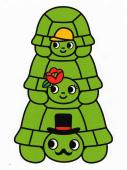1.Are feelings, emotions and facial expressions universal across borders, happy, sad, etc..?
I think that are same.
The Japanese proverb has " facial expressions speak".
2. Try to name as many feelings as possible in Japanese. ( 10 minimum) Then, write the English translation.
①うれしい(happy)
②楽しい(hpppy)
③悲しい(sad)
④めんどくさい(troublesome)
⑤退屈(borling)
⑥刺激的(exciting)
⑦興味のある(interesting)
⑧苦しい(hard)
⑨腹立つ(annoy)
⑩好き(like)
⑪嫌い(dislike)
3. Are there any feelings in Japanese that cannot be translated into English?
Yes. Japanese people often use onomatopoeia.
For example, When someone work a road, Japanse people conceive many sounds.

hi kiki :0]
返信削除please give some examples of onomatopoeia!
i really wanna know~
hello!Becky:)
返信削除Thanks for comment.
When Japanese people describe people moving, We use many adgective.
For example When we describe someone working,We use
トコトコ歩く ヨチヨチ歩く
ドシドシ歩く ノソノソ歩く
トボトボ歩く ヨタヨタ歩く
テクテク歩く フラフラ歩く
I try to trnslate English,
トコトコ and ヨチヨチ are toddle.
テクテク and トボトボ are jog.
Some words has translate English,but We can't translate amply.
I'm sorry...
I can't explain intelligible.
That's right.
返信削除Japanese have more onomatope words.
If we use the words nobody knows, we can understand them somehow.
hello kiki :0p
返信削除thanks for your reply and good exsamples!
i have another interesting example, which is flip-flop: パタパタ in japanese.
flip-flop expresses not only that kind of sound but a type of sandal.
it is interesting isn't it??
Hello, kiki:)
返信削除I didn't find there are onomatopoeia in Japan!
Japanese sometimes use onomatopoeia words, especially, children or in the story etc...
It's interesting!
Hello :)
返信削除There are many onomatopoeia in Japan as you know. It is funny and not so easy to translate.
Hello,kiki!
返信削除Onomatopoeia! Surely, can not be translated.
I think it is difficult to tranlate to other contry words keenly.
hey kiki :)
返信削除I really agree with you.
Japanese often use too much onomatopoeia.
It's difficult to tell those words in English directly..
I think Japanese is a little incomprehensible.
返信削除It is not seen for English.
Hi kiki.
返信削除I agree with your opinion.
Japanese has a lot of onomatopeia words, and it is difficult for us to translate these words.
I am very sorry but I have misplaced the sign-up sheet with the volunteers names and email addresses on it. If you signed up to make potato salad, set-up, cook/serve food, or clean up, please leave me a comment!
返信削除Good evening.
返信削除I didn't know the English word of "onomatopeia."
But I noticed that we use a lot of onomatopeia in our daily life.
For example, "トボトボ歩く"
We often write onomatopeia in katakana, right?
Why do we write these words in katakana?